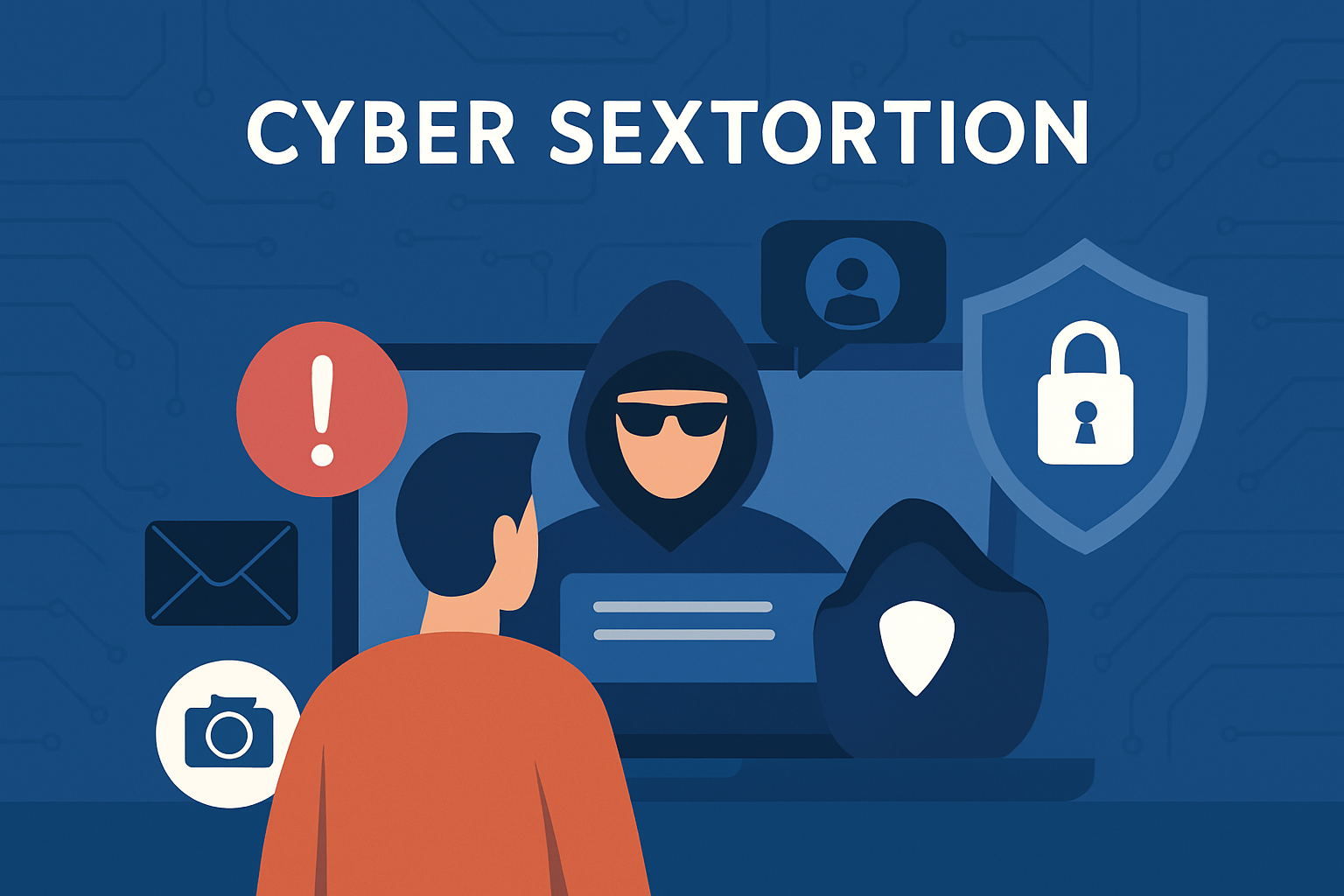
What is Cyber Sextortion?
Cyber sextortion is a form of online blackmail where attackers threaten to release private, intimate, or sensitive content unless their demands are met. These demands usually involve money, more explicit content, or other forms of coercion.
Victims are often tricked into sharing personal images or videos, or hackers may gain unauthorized access to private materials.
Cyber sextortion is a growing cybercrime globally, and it can happen to anyone — regardless of age, gender, or background.
How Does Cyber Sextortion Work?
Cybercriminals typically use:
- Fake social media accounts
- Malware to access webcams
- Data leaks and hacks
- Phishing emails targeting personal information
Once they obtain compromising material, they use fear, shame, and urgency to manipulate victims into compliance.
Who Are Common Targets?
- Teenagers and young adults
- Professionals with strong online presence
- Social media users sharing personal content
- Anyone interacting with strangers online
Attackers often use fake identities to build trust before threatening exposure.
Warning Signs You May Be a Target
Recognizing the early signs of sextortion can save you.
Suspicious Messages or Emails
You may receive unexpected messages, often flirty or overly personal, from unknown profiles.
Requests for Private Photos or Videos
Be wary if someone you barely know quickly pushes you to send private content or join video chats.
Threats to Expose Personal Content
If a stranger threatens to leak your images or videos unless you meet their demands — this is clear sextortion.
Immediate Steps to Take if You Are a Victim
If you suspect you’re being targeted, act quickly.
Do Not Pay the Blackmailer
Paying will not guarantee the threats stop — it often encourages continued harassment.
Preserve Evidence
Take screenshots of all communications, emails, threats, usernames, and profiles. Keep everything organized for authorities.
Block and Report the Account
Block the user on all platforms. Report them to the platform’s abuse or security teams immediately.
Contact Authorities and Cybersecurity Experts
Reach out to your local cybercrime division. In serious cases, cybersecurity specialists can help protect your digital life and track attackers.
How to Report Cyber Sextortion
Reporting to Local Authorities
Contact your country’s cybercrime or law enforcement unit. Many have special divisions for online blackmail and cyber harassment.
Reporting to Social Media Platforms
Every major platform (Facebook, Instagram, TikTok, etc.) has a direct way to report sextortion threats. Report and block immediately.
Contacting Cybersecurity Professionals for Support
Specialized cybersecurity companies (like ours) can guide you step-by-step, secure your accounts, and support you legally and emotionally.
How to Prevent Cyber Sextortion in the Future
Being proactive is key to avoiding cyber threats.
Strengthen Online Privacy Settings
Set all social media profiles to private. Only allow trusted contacts to access personal information.
Use Strong Passwords and Two-Factor Authentication
Protect your email, social media, and cloud accounts with unique passwords and two-factor authentication.
Be Careful with Online Interactions
Never share sensitive content with strangers online, no matter how trustworthy they may appear.
Why Professional Help Matters
Victims of cyber sextortion often experience severe emotional distress. You don’t have to handle it alone.
Technical Cybersecurity Support
Professionals can help remove leaked materials, secure accounts, and trace digital threats.
Emotional and Legal Assistance
Counseling support and legal advice can empower victims to recover faster and pursue justice if necessary.
Frequently Asked Questions (FAQ)
What Should I Do If Someone Threatens to Share My Private Pictures?
Stay calm. Do not respond emotionally. Block the attacker, preserve all evidence, and report the incident immediately.
Can the Police Help with Cyber Sextortion?
Yes, many law enforcement agencies take cyber sextortion seriously. Reporting increases your protection and helps stop the attacker.
How Can I Protect Myself from Sextortion Scams Online?
Limit what you share online, use strong privacy settings, and never send intimate content to unverified individuals.
Will the Blackmailer Go Away If I Ignore Them?
Ignoring can sometimes reduce communication, but it’s essential to report the incident properly. Ignoring without reporting could be risky.
Contact Us for Immediate Cyber Sextortion Support
If you’re experiencing cyber sextortion, don’t face it alone.
Our cybersecurity specialists are here to provide fast, private, and confidential support.
Contact Us Now — Your safety and privacy are our top priority.
Report cyber crimes to INTERPOL.
Report sextortion to FBI Internet Crime Center (IC3).
Cybersecurity tips from CISA (U.S. Cybersecurity and Infrastructure Security Agency).